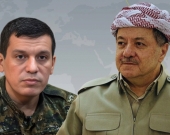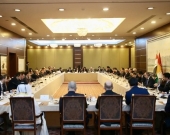Kurdish rebels threaten new fight in Turkey as Syria clashes intensify

Kurdish rebels are ready to re-enter Turkey from northern Iraq, the head of the group's political wing said at his mountain hideout, threatening to rekindle an insurgency unless Ankara resuscitates their peace process soon.
Accusing Turkey of waging a proxy war against Kurds in Syria by backing Islamist rebels fighting them in the north, Cemil Bayik, a founding member of the Kurdistan Workers Party (PKK) told Reuters the group had the right to retaliate.
Syria's civil war has complicated Turkey's efforts to make peace with Kurdish militants, but Ankara strongly denies backing any rebel faction against Kurds in Syria and has held regular talks with the head of a Syrian Kurdish group close to the PKK.
Bayik, the group's most senior figure at liberty, spoke at a small, heavily guarded house in the Qandil Mountain range in Iraq's Kurdish north, a badge featuring jailed PKK leader Abdullah Ocalan pinned to a pocket on his guerilla uniform.
Imprisoned on an island south of Istanbul, Ocalan commands unswerving loyalty from a fervent cadre of guerillas - both men and women - who live in the mountains that straddle the borders between Turkey, Iran and Iraq.
Ocalan began talks with Turkish officials last year to halt a conflict that has left more than 40,000 people dead over the past three decades and earned the PKK a place on a list of terrorist organizations as designated by Turkey, the United States and European Union.
In March, a ceasefire was called and Ocalan ordered his guerillas to retreat from Turkey to Iraq's autonomous Kurdistan region, but the withdrawal was suspended last month as the rebels said Ankara had not held up its side of the bargain.
"The process has come to an end," Bayik said in the interview, which took place on Saturday. "Either they accept deep and meaningful negotiations with the Kurdish movement, or there will be a civil war in Turkey".
As prerequisites, Turkey must improve the conditions in which Ocalan is being held and deal with him on equal terms, guarantee amendments to the constitution and enlist a third party to oversee any further steps in the process, he said.
"Now we are preparing ourselves to send the withdrawn groups back to North Kurdistan if the government does not accept our conditions," said Bayik, who shares his position with a female militant. He said the direction of the process would become clear "in the coming days".
North Kurdistan is the term Kurds use to refer to the area of Turkey they lay claim to as part of a larger homeland that also takes in tracts of Iran, Iraq and Syria, referred to as East, South and West Kurdistan respectively.
"POLITICS IN PRISON"
The PKK took up arms against Turkey in 1984 with the aim of carving out a separate state in the southeast for the country's Kurds, which make up around 20 percent of the population but have long been denied basic political and cultural rights.
Ocalan has since changed his views on violence and statehood, and now seeks devolution of power to Kurds within each of the four countries where they are divided, with an overarching confederation to unite them across the borders.
Negotiations with the PKK were unthinkable until only a few years ago and Turkish Prime Minister Tayyip Erdogan has staked considerable political capital in peace efforts, widening cultural and language rights for Kurds at the risk of infuriating large parts of his grass roots support base.
The effort to negotiate with Ocalan is seen as Turkey's best chance at ending a conflict that has blighted its human rights record, held back its European Union candidacy and undermined economic growth.
For the rebels, it holds out hope of concessions in a struggle with no clear military victor for nearly 30 years.
But the process, which had already lost some momentum, was thrown further into doubt earlier this month when Turkey unveiled a package of reforms Bayik described as "empty".
"That package has nothing to do with democracy," he said, accusing Erdogan of giving false hope. "There is no change in the mentality."
The reforms - which the government says are part of a broader "democratization" drive and not just aimed at solving the Kurdish issue - include proposals to change a vote threshold that kept Kurdish parties out of parliament in the past, and allow for privately funded Kurdish-language education.
But they stopped short of constitutional guarantees for Kurdish identity and culture, greater autonomy and native-language education, and did not touch anti-terror laws that have put thousands of political prisoners behind bars, Bayik said.
"We silenced our weapons so that politics could speak, but now we see that politics is in prison".
"BANDIT GROUPS"
Seated in a carpeted living room with two starred PKK flags behind him, Bayik said whilst his side had abided by the ceasefire, Turkey had simply moved the frontline in its fight against Kurds to Syria, where civil war has raged for more than two years.
The PKK accuses Ankara and influential Turkish preacher Fethullah Gulen of recruiting and training Islamist "bandit groups" to fight Kurds in Syria on their behalf.
"At a time when the Turkish government is helping the bandit groups and is waging a war on the people of West Kurdistan... it is the right of the Kurdish people to bring the fight to Turkey," Bayik said, referring to the northeastern corner of Syria, where a Kurdish group aligned with the PKK is in control.
Ankara denies arming the rebels or facilitating the passage of foreign fighters who have gone to join al Qaeda-affiliated factions in Syria, including the Islamic State of Iraq and the Levant, and the Nusra front.
Asked whether the PKK had sent guerillas to reinforce the ranks of fellow Kurds in Syria, or would consider doing so in future, Bayik said they did not need help.
"We don't want to send them to West Kurdistan," he said. "If the Turkish government wants to insist on fighting, North Kurdistan is the field of war".
However he admitted some Kurds from Syria who had previously fought with the PKK in Turkey had returned home of their own volition, and that young Kurds in Turkey increasingly felt compelled to go to Syria and fight there.
"This is a very dangerous development".
On the road twisting steeply up into the Qandil mountains, PKK fighters with Kalashnikovs slung over their shoulders wave trucks and cars through checkpoints that demarcate their territory from the rest of Iraqi Kurdistan.
The rebel-controlled enclave sits uneasily within Iraqi Kurdistan, a quasi-state rich in hydrocarbons which has recently cultivated close ties with energy-hungry Turkey.
Bayik said in principle the PKK had nothing against Iraqi Kurdistan developing good relations with Ankara, as long as they were based on "equality, freedom and democracy".
"Relations based on oil and gas and economy: we don't find such relations right, and they don't serve a solution to the Kurdish question," Bayik said.
"Turkey used to fight with South Kurdistan... on the field, but now they want to win the war from inside the castle".
(Additional reporting by Nick Tattersall in Istanbul; editing by Philippa Fletcher)
By Isabel Coles












